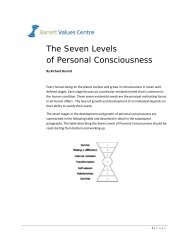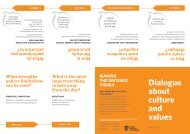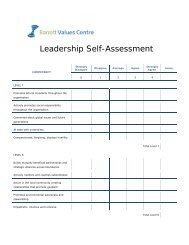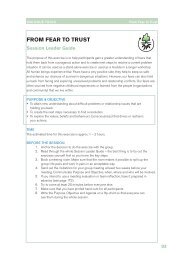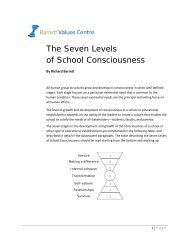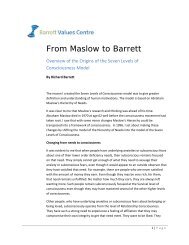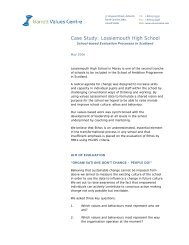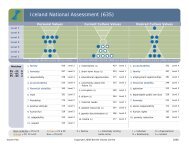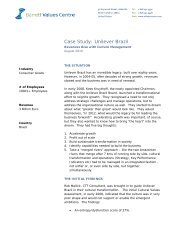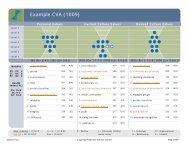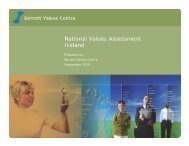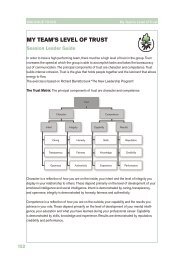Case Study: Emeco - Barrett Values Centre
Case Study: Emeco - Barrett Values Centre
Case Study: Emeco - Barrett Values Centre
Create successful ePaper yourself
Turn your PDF publications into a flip-book with our unique Google optimized e-Paper software.
37 Haywood Street, AshevilleNorth Carolina 28801United StatesTel: 1 828 252 5550Fax: 1 828 252 5558Web: www.valuescentre.com<strong>Case</strong> <strong>Study</strong>: <strong>Emeco</strong>Mining Services Company Uses <strong>Values</strong> to Navigate ChangeJanuary 2012Industry:Mining Services:Equipment# of Employees:750Revenue:500 million AUD(1 billion AUD capitalinvested)Country:Headquarters in Australia.Operations in Canada,Indonesia, Australia andSouth America.Website:http://www.emeco.com.au/Consultant:Lui PangiarellaLoop Advisory+61 419 940 272lui@loopadvisory.com.auwww.loopadvisory.com.auTHE SITUATIONIn late 2009, Keith Gordon joined <strong>Emeco</strong> as Chief Executive Officerand introduced three non-negotiables for the business: Safety,Financial Performance and Culture (People).From a safety perspective, every <strong>Emeco</strong> employee was maderesponsible for their own personal safety and the safety of thosethey work with.Since the 2006 float of <strong>Emeco</strong> on the Australian Stock Exchange,the company had experienced highs and lows. <strong>Emeco</strong> survived theglobal financial crisis intact, however, Keith acknowledged that theCompany wasn’t as ‘financially fit’ as it could be.In January 2010, having gained a solid understanding of thebusiness, its structure and culture, Keith and the <strong>Emeco</strong> ExecutiveLeadership Team (ELT) implemented a new five year businessstrategy which was rolled out internally and to the broader market.<strong>Emeco</strong>’s business strategy focused on three key pillars:1. Optimise the core2. Sustainable growth3. Consistent Value Creation for ShareholdersBy July 2010, significant progress had been made to optimise<strong>Emeco</strong>’s core business operations. This included a shift away froma mix of civil earthmoving equipment, to a clear focus on small andlarge mining equipment. The decision was also made to exit anumber of under-performing businesses within the <strong>Emeco</strong> group.By the second half of 2010, <strong>Emeco</strong> was becoming a strongerbusiness financially and its leadership team could turn its attentionto Keith’s third non-negotiable, Culture (People).The company and its people were going through a significant timeof change with the business restructure. Embarking on an effort tochange the internal culture of the business at the same time couldhave been seen as a risk, however, the <strong>Emeco</strong> ELT identified that
this could also be an opportunity: A point in time when employeeswould provide honest, ‘warts and all’ feedback on how they feltabout working at <strong>Emeco</strong> and their perception of its culture.In August of 2010, <strong>Emeco</strong> undertook an initial Cultural <strong>Values</strong>Assessment with two levels of management (a total of 36 people).The results showed a disconnect between the view of the ELT andother managers. There was disparity and a lack of culturalalignment.A month later, the <strong>Values</strong> Assessment was rolled out to allemployees across Australia, Indonesia and Canada. Approximately50% of employees chose to participate in what was the company’sfirst survey of employees. This was viewed as a good result givenlanguage, time differences and the remote positioning of manyemployees.The level of participation told the <strong>Emeco</strong> ELT that regardless of theresults, employees were keen to ‘have a say’ in the future of theirbusiness.On the downside, the entropy level, an indicator of perceived dissatisfaction,was high at 32%.The assessment also highlighted gaps in values and culture whichlater enabled the identification of <strong>Emeco</strong>’s Vision, Mission and<strong>Values</strong>. Not one of <strong>Emeco</strong>’s now core values appeared in theCurrent Culture of the company at the time of the first assessment.Two of the core values appeared among the top Desired Culturevalues, and there was only one match between the Current Cultureand Desired Culture.IMPLEMENTING THE CHANGE JOURNEYWhile the results of the initial Cultural <strong>Values</strong> Assessment createdfurther impetus to focus on culture, it also enabled the business toidentify priority needs to improving working conditions, and todevelop a clear strategy and global execution plan.The global execution plan included the following priorityimprovements which were communicated to the business inNovember 2010:1. Developing a shared vision and clear strategy – Employeesacross the global business needed a common focus. Assuch, the ELT developed a Vision, Mission and <strong>Values</strong> basedon internal and external contributing factors. The four core<strong>Values</strong> selected were collaboration, accountability, integrityand continuous improvement.As part of <strong>Emeco</strong>’s people strategy, a number of initialprojects were identified. These aimed to reduce theresistance of employees to change and improve internal
human resources systems and processes in order to bettersupport employees in their roles. The initial improvementprojects were:o Establish a cultural identityo Communicate the changeo Establish a global Human Resources Steering Committeeo Create job descriptions for all job familieso Conduct a Performance Management process review andimplement improvementso Conduct a Training & Development review andimplement improvementso Establish a coordinated approach to career andsuccession planning2. Development and launch of a cultural identity - It wasidentified that in order to engage employee support for thechange, an internal brand representing a new <strong>Emeco</strong> Vision,Mission and <strong>Values</strong> would be developed. All the work carriedout as part of <strong>Emeco</strong>’s people strategy would also fit underthe internal brand. In November 2010, “Empower” waslaunched across <strong>Emeco</strong> globally, articulating a clear focuson empowering <strong>Emeco</strong> people to achieve and succeed intheir roles, and making a good place to work GREAT. Thecompany’s CEO and relevant members of the ELT attendedeach of the 30-plus half-day “Empower” sessions heldacross <strong>Emeco</strong>’s operations in Indonesia, Canada andAustralia. The workshops were interactive with each groupproviding the opportunity to discuss the current, desiredand core values, as well as discussing perceived roadblocksand possible initiatives to support internal improvement.3. Leadership development – An 18 month roadmap towardschange was implemented to build cultural awareness andcompetence from the top levels of management throughoutall employee levels. This included:o 360-Degree Behavioural Assessment and Coaching forthe Executive Leadership Team. Led by Lui Pangiarella,the 360-degree Leadership <strong>Values</strong> Assessments wereconducted over a six month coaching period using twotools, the <strong>Barrett</strong> <strong>Values</strong> <strong>Centre</strong> 360 LVAs and CliftonStrengthsfinder;o Full disclosure and transparency of the results of theassessments to <strong>Emeco</strong> managers;o Leadership training for the top four tiers of managementon how to address behavioural issues in the workplace(Having the Difficult Conversation)o Resilience and proactivity training for all individuals(Managing Yourself in Times of Change)4. Transparency of the <strong>Values</strong> Results - In January 2011, thetop 35 managers of <strong>Emeco</strong> (from Canada, Indonesia andAustralia) came together to revisit progress against thebusiness strategy, and to discuss in detail the Empower
people strategy. This included an overview of the <strong>Barrett</strong><strong>Values</strong> <strong>Centre</strong> Seven Levels of Consciousness model and,given the results of the September 2010 Assessment, a lookat employees’ comments in the open-answer section of theassessment. This highlighted to a broad group of leaders inthe business the impediments to both cultural and strategicchange that existed across <strong>Emeco</strong>’s various workplaces.This also helped a key group of stakeholders in the changeprocess to understand and take accountability for thechanges that needed to be implemented.5. Managing Yourself in Times of Change Workshop – Thisworkshop (developed by another <strong>Barrett</strong> Consultant, JennyRoberts of performHR) followed directly after the opendiscussion of the September 2010 results with the top 35<strong>Emeco</strong> mangers. This interactive workshop providedparticipants with simple tools to:o Understand the reasons behind why we, as humans,react negatively to situations;o Change how to perceive situations (both personallyand professionally) from reactively to proactively;ando Identify what can be done that makes a positivechange to the situation.6. Empower 2011 Leadership Conference - In April 2011, aglobal leadership development conference was held with thetop 75 managers from <strong>Emeco</strong>’s Australian, Indonesian andCanadian operations. The purpose of this event was to buildrelationships between key decision-makers across thebusiness, to open communication lines, and to promoteinformation sharing. The Empower 2011 LeadershipConference also sought to build alignment between thecompany’s business and people strategies, and to equipmanagers with the information and skills required to engagewith their teams to communicate these important messagesfurther. This included a step-by-step guide for managers(based on the books Difficult Conversations and CrucialConversations) around constructive conversations. Theintent being to not dwell on the past but to set clearexpectations of future behaviours and, most importantly,gain a real commitment to making the change to therequired behaviour. This part of the program linked to theEmpower values of accountability and integrity.7. Empower roadshow 2 & National Rollout of “Managing Selfin Times of Change” - While work on the initial Empowerimprovement projects continued, in June 2011, a secondseries of face-to-face Empower workshops were conductedaround the business to update all employees on theprogress being made and to provide another opportunity forinformal, face-to-face communication. The Managing Self inTimes of Change workshop was also rolled out acrossAustralia to approximately 200 employees at all levels of
the organisation. These workshops were under the bannerof Empower and re-enforced once again <strong>Emeco</strong>’s Vision,Mission and <strong>Values</strong>.8. Inductions and Job Descriptions – <strong>Emeco</strong>’s core values arenow part of the global <strong>Emeco</strong> induction process andincluded in every employee’s position description as well asthe annual performance management process.OUTCOMESFrom a business perspective, <strong>Emeco</strong> outlined its business strategyand has delivered on commitments made. The company’sperformance as measured by profitability and returns on capitalhas improved. There has also been a corresponding increase in<strong>Emeco</strong>’s shareprice (ASX:EHL) and improved dividends toshareholders since the business strategy was announced.<strong>Emeco</strong>’s safety performance has improved by nearly 40% whichcan be linked back to the core values of collaboration,accountability, integrity, and continuous improvement. <strong>Emeco</strong>employees are all accountable for ensuring the safety of theirteam mates (collaboration) and speaking up (integrity) if there isa hazard or opportunity to make a task more safe (continuousimprovement).Culturally, Keith Gordon has also seen a change as he travelsaround the business talking to employees.Keith Gordon said, “<strong>Emeco</strong> people know that they all have a partto play in the success of our company. I think it’s fair to say thatmore than 12 months down the track, people have seen first-handthat we are investing resources to help them achieve and succeedin their roles, and that we will continually look for ways to make<strong>Emeco</strong> an even better place to work and great place to stay for afulfilling career”.In September of 2011, a second Cultural <strong>Values</strong> Assessment wasconducted. 328 employees participated, a 60% increase on theprevious year.Some of the notable outcomes in the 2011 results include:• Overall entropy dropped from 32% to 24%.• The entropy in Canada dropped from 27% to 14%.• The entropy in Indonesia dropped from 33% to 18%.• In 2010, <strong>Emeco</strong>’s core values appeared among employees’Desired <strong>Values</strong>, not their top Current Culture values for thebusiness. Several of the core values are now among the topvalues in the Current Culture. Continuous improvement wasfirst, teamwork was fourth (they see this similar to
collaboration), and accountability was eighth. The strengthof these values in the Desired Culture also increased.The <strong>Emeco</strong> ELT recognises that these changes are a result ofalignment between the company’s business and people strategies,and the clear communication of a shared vision.The 2011 results helped to plan the path forward in terms of thepeople strategy and therefore new priority areas for improvement.In 2011, <strong>Emeco</strong> also looked at results based on sub-groups andidentified that a particular group of team leaders within thebusiness was feeling strain far greater than other groups ofemployees. These team leaders work on the front line with five tonine direct reports, and were showing seven potentially limitingvalues in the Current Culture. Team leaders interact daily with theirteam members. If they are feeling strain, they are a lead indicatorfor the company. The <strong>Emeco</strong> ELT was appreciative that the surveyunveiled these issues, and as such, in 2012 has developed anotherface-to-face workshop programme focused at the team leader levelwhich aims to share the results and invite open discussion aroundthe big issues facing this group. Team leaders are beingencouraged to use the difficult conversations process with theirmanagers as well as their teams. Each member of the ELT has alsodeveloped personal actions around direct engagement with teamleaders within their lines of responsibility.As <strong>Emeco</strong>’s journey continues, a Leadership CompetencyFramework that was developed as part of the job description andperformance management improvement projects is also now beingused to support the development of <strong>Emeco</strong>’s future leaders.<strong>Emeco</strong> is truly focused on delivering its Vision, “to contribute to asustainable and productive mining industry, and to create a greatworkplace for [its] people and teams.”
EMECO 2010
EMECO 2011



